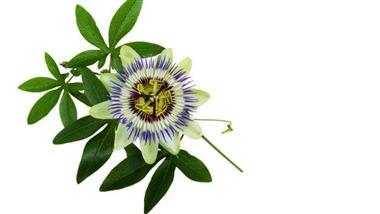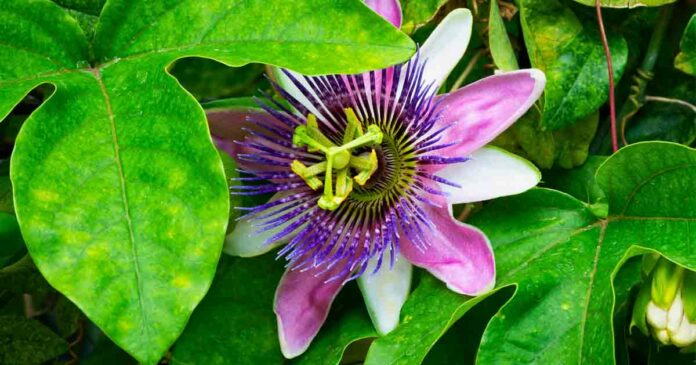Discover Passion Flower’s Benefits and Uses

Story at-a-glance
- Traditionally, passion flower is known to help alleviate symptoms of anxiety. Studies have shown that this herb may specifically reduce anxiety in people who are preparing to undergo dental treatment and outpatient surgeries. It may also help improve sleep quality with its sedative and anxiolytic properties
- Studies have also found that when this plant is brewed as a tea or added as an ingredient in supplements, it may help provide benefits against menopausal symptoms, ADHD, dementia and Parkinson’s, and may help alleviate alcohol and opiate withdrawal syndrome
- Some varieties of passion flower produce passion fruit, which may be used as an ingredient in fruit salad or made into juice, syrup, jams and jellies
With approximately 520 known species,1 the attractive and colorful petals of the passion flower may have caught your attention. Aside from being an interesting addition to a garden, its leaves, which may be dried or extracted, are commonly known to help alleviate sleep and anxiety problems.2
Although its name is usually associated with aphrodisiacs, the origin of passion flower’s name and its health benefits are actually not relevant to this connotation.3 You can learn more about passion flower’s numerous uses and benefits by reading this article.
What Is Passion Flower?
Passion flower (Passiflora L.)4 is a climbing plant known for its colorful and unique-looking flowers, which are commonly made up of two to three varying colors like blue, white, yellow, lavender and red.5 Most passion flower species can be found in Central or South America, while some plants grow in North America, Southeast Asia and Australia.6
Passion flower’s name came from Catholic missionaries who associated the flower’s structure with the Passion of Christ. As explained in the book, “Wildlife and Plants:”
“The five petals and five sepals represent the ten disciples (minus Judas and Peter), the corona represents the crown of thorns, the five stamens equal the number of wounds Christ received, and the lobed stigmas represent the three nails.”
In Japan, passion flower is called “the clock plant,”7 or Tokeiso, because it resembles a clock.8
7 Passion Flower Benefits That You Should Know
Passion flower has long been recognized as an herb that may help alleviate anxiety and may be considered an alternative to sedatives.9 Additionally, studies have found that passion flower may benefit the following health conditions as well:10
• Opiate withdrawal — Passiflora incarnate extract exhibits an anxiolytic effect, which may help manage the mental symptoms of opiate withdrawal.11
• Alcohol withdrawal syndrome — A 2017 study found that passion flower’s analgesic properties may help reduce the symptoms of alcohol withdrawal syndrome in rats.12
• Dementia and Parkinson’s — Passion flower is found to contain butanolic extract, which is associated with neuroprotective and antioxidant properties. This plant may help minimize the symptoms of Alzheimer’s disease and Parkinson’s disease.13
• Attention-deficit hyperactivity disorder (ADHD) — Consuming dried aerial parts of a passion flower is considered a traditional remedy for ADHD. A 2005 controlled study found that passion flower may help alleviate ADHD in children.14
• Menopause — Menopausal symptoms such as muscular pain, depression, palpitation, anger and headache were found to be less intense and pronounced with the help of this herb.15
• Anxiety — A 2002 study found that passion flower may help manage generalized anxiety disorder. Job performance may be less affected with passion flower extracts as compared to oxazepam,16 a medicine usually prescribed to help relieve anxiety.17
Studies also found that passion flower extract, given as a premedication, may help reduce anxiety in people undergoing dental treatment18 and outpatient surgery.19
• Insomnia and sleep difficulties — A 2011 study found that Passiflora incarnata, which is traditionally used as an herb for its sedative and anxiolytic properties, may help improve sleep quality. It was given in tea form, in low doses, to the participants.20
Other Common Uses for Passion Flower
The passion flower’s leaves are not its only useful component; aside from the previously mentioned health benefits, here are some other uses for this plant that you should know about:
- Produces fruit or vegetables — Some passion flower varieties produce purple and yellow passion fruits, which are commonly found in markets. This fruit is about the size and shape of an egg, and may be eaten as a vegetable if unripe.21 Maypop, a passion flower variety, produces a sweet, yellowish fruit, which can be used as an ingredient in fruit salad or made into juice, syrup, jams and jellies.22
- Produces food for butterflies — Heliconid caterpillars, which turn into longwing butterflies, feed on passion flowers. They lay their eggs on the leaves as well.23
Does Passion Flower Have Side Effects?
Although passion flower is generally considered safe, I recommend consulting a health care expert before consuming this herb. Pregnant women should avoid it because it may trigger contractions.24 If taken together with other drugs or herbs in excessive amounts, it may cause side effects such as:25,26
- Dizziness
- Confusion
- Tremor
- Fatigue
Growing Passion Flower in Your Garden
A passion flower plant is easy to grow, and is a wonderful addition to gardens because of its colorful flowers. It thrives in humid environments, but it can tolerate low temperatures as well. It can be grown in pots or beds — but if you do not want its vines to spread all over the garden, it is recommended you grow it in a pot and prune it often.27 Here’s how to grow passion flower from seeds:28
- Soak the seeds of ripe passion fruit in warm water for one to two days. Throw out the floating seeds.
- Place the remaining seeds on the surface of a damp potting mix. Gently pat them down, and then place the pot in a plastic bag. For better results, place the bag on a heating pad and seal the bag to maintain its moisture.
- Transplant the sprouts once they appear. It will usually take a few weeks or months.
Here are additional tips in growing passion flower:29,30
- Passion flower plants need at least four full hours of sunlight in a day, but keep them out of direct sunlight.
- Keep the soil moist. Do this through one to two deep waterings per week.
- Provide support such as a trellis or another plant where its vines can grow on.
- Watch out for common passion flower pests like mealy bug and whitefly.
How to Store Dried Passion Flower
Like most herbs, passion flower can be dried and kept for later use. Place them in an airtight container, canning jar or zip-close bags to retain their flavor and aroma. This container must be stored in a cool, dry place away from direct sunlight. Remember to label the container to avoid confusion with other herbs. Also, include the passion flower’s date of production — it may not be recommended to use them after a year as they may lose their flavor and aroma.31
How to Make Passion Flower Tea
Traditionally, passion flower was used as a sedative in North America and as an herbal medicine for insomnia and anxiety in Europe.32 If you have a sleeping problem, you may also drink passion flower tea as it was found to help improve sleep quality.33 Here are the steps in making passion flower tea:
- Pour boiling water over 2 grams or a teaspoon of finely cut dried passion flower.
- Steep for five to 10 minutes, and then pass through a tea strainer.
You can drink two to three cups of passion flower tea a day or one to two cups before sleeping.
(From “Herbal Drugs and Phytopharmaceuticals: A Handbook for Practice on a Scientific Basis”34)
Frequently Asked Questions (FAQs) About Passion Flower
Q: What is passion flower good for?
A: Passion flower is commonly known to help alleviate symptoms of anxiety and sleep problems. It may also be beneficial for menopausal symptoms, ADHD, dementia and parkinsonism, and alcohol and opiate withdrawal syndrome.
Q: When do passion flowers bloom?
A: Passion flowers bloom in mid- to late summer.35
Q: Where can I buy passion flower?
A: Passion flower plants and herbs,36 as well as supplements, are available online and in health food stores.37
Q: Is passion flower good for anxiety?
A: A number of studies have found that passion flower extract may help manage symptoms of anxiety. It may help lessen anxiety in people who will undergo dental treatment and outpatient surgery.
Q: Is passion flower safe?
A: Yes. Passion flower, specifically its extract, may be used as an ingredient for supplements, while its dried leaves may be brewed to make tea.
Q: Are passion flowers poisonous to insects?
A: When chewed by insects, passion flower leaves may be poisonous, because they release cyanide. The caterpillars of the heliconid butterflies are one of the few insects that are unaffected by this toxin.38
Q: Are passion flowers edible?
A: Yes. The leaves of passion flower may be dried and brewed to make herbal tea, while its extracts may be used as an ingredient in capsules or tinctures.39
Q: How do I take care of a passion flower plant?
A: It is recommended to prune passion flower plants, as their roots may expand over open areas. You can avoid this by growing this plant in a pot to help inhibit the spread of its roots.40
Sources and References
- 1, 6, 32 J Ethnopharmacol. 2013 Dec 12;150(3):791-804
- 2, 24 National Center for Complementary and Integrative Health, “Passionflower”
- 3 “Healing Herbs: A Beginner’s Guide to Identifying, Foraging, and Using Medicinal Plants” 2015
- 4 USDA Natural Resources Conservation Service, “Passiflora L.”
- 5, 27, 30, 40 “Greenhouse Gardener’s Companion: Growing Food and Flowers in Your Greenhouse Or Sunspace,” 2000
- 7, 21, 38 “Wildlife and Plants., Volume 13,” 2007
- 8 Oryza, August 23, 2017
- 9 “Prescription for Herbal Healing,” 2002
- 10 Phytother Res. 2011 Jun;25(6):838-43
- 11 J Clin Pharm Ther. 2001 Oct;26(5):369-73
- 12 Phytother Res. 2017 Aug;31(8):1199-1208
- 13 Anc Sci Life. 2017 Apr-Jun; 36(4): 200–206
- 14 Therapy. 2005 July;2(4):609-614
- 15 Iran J Nurs Midwifery Res. 2010 Autumn; 15(4): 202–207
- 16 J Clin Pharm Ther. 2001 Oct;26(5):363-7
- 17 Medline Plus, “Oxazepam”
- 18 J Dent (Shiraz). 2013 Jun; 14(2): 68–72
- 19 Anesth Analg. 2008 Jun;106(6):1728-32
- 20, 33 Phytother Res. 2011 Aug;25(8):1153-9
- 22 “What Makes Heirloom Plants So Great?: Old-Fashioned Treasures to Grow, Eat, & Admire,” 2010
- 23 “A Neotropical Companion: An Introduction to the Animals, Plants, and Ecosystems of the New World Tropics,” 2015
- 25, 37 Medical News Today, November 23, 2018
- 26 “Herbal Supplements and the Brain: Understanding Their Health Benefits and Hazards,” 2012
- 28, 29 The Spruce, March 11, 2019
- 31 The Spruce, January 8, 2019
- 34 “Herbal Drugs and Phytopharmaceuticals: A Handbook for Practice on a Scientific Basis,” 2004
- 35 “Homegrown Herbs: A Complete Guide to Growing, Using, and Enjoying More than 100 Herbs,” 2015
- 36 “50 More Ways to Soothe Yourself Without Food: Mindfulness Strategies to Cope with Stress and End Emotional Eating,” 2015
- 39 “Effects of Psychoactive Chemicals on Commercial Driver Health and Performance: Stimulants, Hypnotics, Nutritional, and Other Supplements,” 2011

